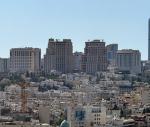You are here
New regional challenge
Nov 25,2014 - Last updated at Nov 25,2014
While international and regional efforts are focused on fighting Islamic militants in Syria and Iraq, one country is quickly emerging as an immediate danger to its neighbours, to most of North Africa and perhaps to Europe.
Libya is already a failed state; a divided country with two governments and two parliaments and hundreds of tribal factions fighting under different banners.
In the chaos and break out of violence that followed the overthrow and summary execution of dictator Muammar Qadhafi in October 2011, government institutions began to collapse and factional confrontations gripped most of Libya.
Attempts to keep Libya united and maintain a political process failed repeatedly and militant groups, belonging to various tribes, quickly divided the country among themselves.
Today, a coalition of various Islamist factions, the Dawn of Libya, is in control of Tripoli. In the past few days, the air force of the national Libyan army began bombing selected targets in the capital and other towns in the west of the country.
In Benghazi, Libya’s main city in the east, militants belonging to Ansar Al Sharia, designated by the UN as a terrorist group, are fighting a bloody war for control of the city against the forces of retired Gen. Khalifa Haftar and the Libyan national army.
The Libyan uprising against Qadhafi’s rule in February 2011 would not have succeeded without the intervention of Western forces. NATO air force, comprised mostly of US, French and British planes, destroyed Qadhafi’s militias and provided essential logistical aid to armed rebel groups from various tribes.
But no sooner had the regime collapsed than Western support for a sustainable political process began to wane.
Following the killing of US ambassador in Benghazi in September 2012, allegedly by Al Qaeda affiliated terrorists, the Western presence in the country was quickly reduced. Today most foreign embassies remain closed.
Special UN envoy to Libya Bernardino León failed to launch a national dialogue among various factions. The General National Council in Tripoli, associated with Islamist forces and controlled by the Muslim Brotherhood, has been reinstated through a controversial ruling by a constitutional court two weeks ago, which effectively dissolved the elected parliament that has been relocated to Tobruk.
As the country slipped into civil war, a newcomer emerged on the scene in Libya. Fighters loyal to the Islamic State (IS) have taken control of the city of Derna, in the east, in the past few weeks.
This is the closest IS-controlled city to Europe: about 320 kilometres from the EU’s southern shores.
Reports say that IS militants include Libyan jihadists who had returned from Syria and Iraq, in addition to other fighters from North Africa.
The militant faction in Derna calls itself the “Barqa” provincial division of IS which is the Roman name given to eastern Libya. Many tribes in the east are calling for a state of their own in the Barqa province, which includes Benghazi and most of Libya’s oil fields in the east.
The chaos in Libya will go on for many years.
The current military campaign by the national army and Haftar’s forces is unlikely to succeed in chasing out Islamist rebels and uniting the country.
Naturally, the destabilisation of Libya threatens its neighbours.
Last week, Egyptian President Abdel Fattah Al Sisi urged the United States and Europe to provide assistance to the Libyan army in its fight against Islamist militants.
Egypt believes that Libyan jihadists are providing Ansar Beit Al Maqdis in Sinai, another group now affiliated with IS, with weapons and fighters.
The long desert border between Egypt and Libya is a security nightmare for the Egyptian army, which has been waging a bloody war against militants in Sinai.
Sisi believes that concentrating military efforts on Syria and Iraq will make Libya an attractive option for IS militants.
Egypt and the UAE denied reports that their air force had carried out strikes against militants in Libya. But UAE’s Foreign Minister Abdullah Ben Zayed was quoted last week as saying that his country had “a huge responsibility in getting Libya on the right side”.
He added: “We believe especially that the countries that played a role in getting rid of Qadhafi, first of all, should have played a far bigger role the day after. They haven’t.”
But with the United States and its allies caught up in an extended military campaign in Syria and Iraq, it is difficult to see a change in policy to encompass Libya in the fight against IS militants anytime soon.
Furthermore, providing air cover to the Libyan army will not be enough to dislodge Islamist fighters from key positions, as the two-month allied bombardment of Kobani on the Syrian-Turkish border has proved.
Libya has indeed become a huge geopolitical liability.
Addressing the complex problem there will require regional and international effort. Failure to realise that the Libyan situation will get more complicated in the coming weeks will force America’s allies to act unilaterally.
Egypt and the UAE are already doing that. But will it be enough?
The writer is a journalist and political commentator based in Amman.











